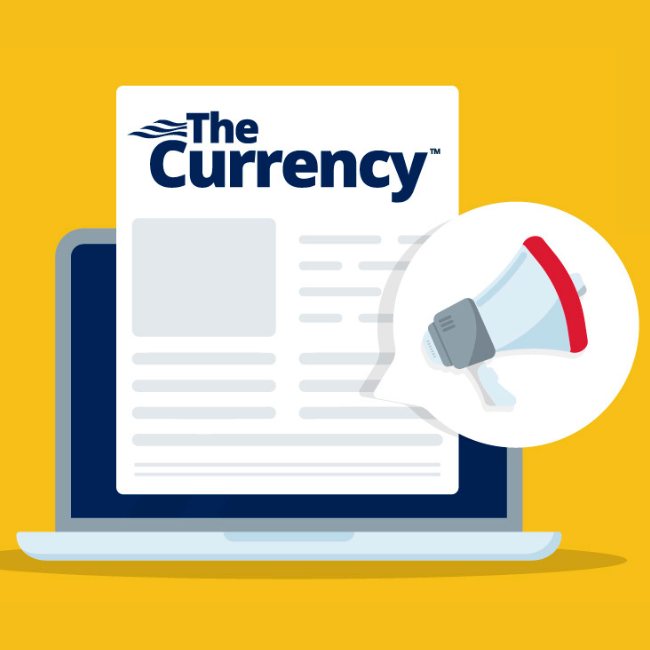Adding Value: Financial literacy month is here
Adding Value: Financial literacy month is here
Adding Value: Financial literacy month is here


Listen
·It’s hard to understate the value of financial literacy two decades after Congress passed a 2004 law to recognize its importance every April.1
Americans have experienced many highs in their financial lives since then — including a couple real estate booms and the longest bull market that U.S. stocks have ever seen. There’s also been a financial crisis, a pandemic, and the return of high inflation.2
It’s also hard to downplay the importance of financial literacy in the digital age. The use of personal checks has fallen 75% in the past 20 years while debit card usage surged tenfold. Students learning about financial literacy these days are likely to skip both products in favor of digital wallets such as Apple Pay, Venmo and Zelle.3
April is Financial Literacy Month and The CurrencyTM will focus on these trends readers need to know:
K thru12: The knowledge pool expands
The ease of managing money in the digital world doesn't mean that students can skip learning fundamental financial skills — from establishing retirement and emergency savings accounts to managing a household budget. The Currency will delve into some of these essentials for establishing a solid foundation to build financial freedom.
As more Millennials become parents, they’re intent on raising their kids with one thing: financial security. Empower research reveals that “money talks” are less taboo these days among Millennials, but parents might be unsure about the ideal age to start the conversation, or which lessons to convey.
The Currency will examine these questions and the role that social media is playing in teaching young children about money. A growing number of teens are getting proactive about money management as more states have financial literacy requirements for high school students.4,5
But knowledge gaps have led many curious students to seek extra support outside the classroom. The Currency will explore the expanding financial education movement, highlighting programs across the U.S. that help young people build financial confidence.
Digital mindset
The future of financial education is changing quickly with digital tools and apps.
Gamification is one method that is increasingly being used to foster financial literacy in the digital age. Behavioral economics is another, especially in the age of contactless payments.6 The Currency will also explore how financial education must keep up with the rise of social media influencers endorsing products from credit cards to crypto.7
Understanding money goes beyond knowing market fundamentals. It taps directly into human psychology. The Currency will examine how emotional triggers can impact financial decisions due to the fear of missing out (FOMO) or because of decision-making blind spots such as overconfidence.8,9 Stress can also impact spending and drive financial behavior. Emotions don’t need to be erased from financial decisions, they just need the right seat at the table.10
Get financially happy
Put your money to work for life and play
1 NYU, “Financial Literacy Month,” accessed March 2025.
2 MarketWatch, “The top 25 market events of the last 25 years,” October 2022.
3 CNBC, “The death of the personal check: As retailers move toward ‘check zero,’ here’s what that means for you,” July 2024.
4 401kSpecialist, “Financial Literacy Attendance Grows, Yet Knowledge Gaps Persist,” March 2025
5 WLKY, “Kentucky bill requiring financial literacy classes signed into law,” March 2025
6 Forbes, “Gamification Shaping Financial Engagement In The Digital Era,” March 2025.
7 New York Times, “Financial Advice on Social Media Is Growing. And Risky,” January 2025.
8 CNBC, “Generative AI ‘FOMO’ is driving tech heavyweights to invest billions of dollars in startups,” March 2024.
9 Harvard Business Review, “What Are Your Decision-Making Strengths and Blind Spots?” August 2022.
10 Psychology Today, “How Emotions Impact Your Financial Decisions,” March 2024.
RO4363549-0425
The content contained in this blog post is intended for general informational purposes only and is not meant to constitute legal, tax, accounting or investment advice. You should consult a qualified legal or tax professional regarding your specific situation. No part of this blog, nor the links contained therein is a solicitation or offer to sell securities. Compensation for freelance contributions not to exceed $1,250. Third-party data is obtained from sources believed to be reliable; however, Empower cannot guarantee the accuracy, timeliness, completeness or fitness of this data for any particular purpose. Third-party links are provided solely as a convenience and do not imply an affiliation, endorsement or approval by Empower of the contents on such third-party websites. This article is based on current events, research, and developments at the time of publication, which may change over time.
Certain sections of this blog may contain forward-looking statements that are based on our reasonable expectations, estimates, projections and assumptions. Past performance is not a guarantee of future return, nor is it indicative of future performance. Investing involves risk. The value of your investment will fluctuate and you may lose money.
Certified Financial Planner Board of Standards Inc. (CFP Board) owns the certification marks CFP®, CERTIFIED FINANCIAL PLANNER™, CFP® (with plaque design), and CFP® (with flame design) in the U.S., which it authorizes use of by individuals who successfully complete CFP Board's initial and ongoing certification requirements.





